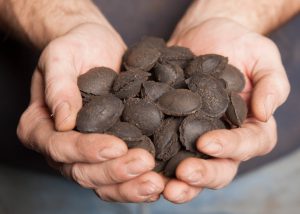Missouri-based Enginuity Worldwide hosted a group of energy delegates from Hungary recently where they learned more about the company’s biotechnology efforts. The company has developed technology that turns local agriculture waste into renewable solid  biomass fuel. The delegation was comprised of project developers, including Gabor Nagy, Andras Herozeg, Daniel Szollosi-Nagy, and Gabor Kaczmarczyk, who spent time assessing Enginuity’s patented rotary compression technology to deploy for use in Hungary.
biomass fuel. The delegation was comprised of project developers, including Gabor Nagy, Andras Herozeg, Daniel Szollosi-Nagy, and Gabor Kaczmarczyk, who spent time assessing Enginuity’s patented rotary compression technology to deploy for use in Hungary.
“As countries around the world search for ways to reduce carbon emissions, Enginuity has developed a cost-effective, viable way for countries to meet baseload renewable requirements,” said Kaczmarczyk, a member of the Hungarian delegation. “We are interested in sharing ideas that can lead to partnerships and investment opportunities, many of which we discussed during this visit. We look forward to working with Enginuity to build on the successful conversations we had during this trip, and would like to thank the leaders at Enginuity who helped make this possible.”
The visit began with a visit to Enginuity’s headquarters, located at the Missouri Plant Science Center, followed by a visit to the Missouri State Capitol, where the House of Representatives and Senate recognized the delegation for their leadership in the renewable energy industry. The delegation’s trip concluded with an event hosted by the Mexico Missouri Chamber of Commerce.
Missouri State Senator Jeanie Riddle, who spent time with the delegation, noted, “It was a pleasure to have a delegation from Hungary visit the Capitol with the entire team of Enginuity Worldwide. Their desire to procure new technology shows the growing success that Enginuity is having worldwide. Missouri must continue to support and encourage growth in new forms of biotechnology that go hand in hand with agriculture, our number one industry.”
Enginuity’s patented rotary compression technology transforms abundant , locally grown feedstocks such as corn stover, sorghum stover and woody waste, into energy-dense, easily transportable biomass – better known as BioCoal™ Fuel. The company says its technology does not use an external heat source, like other biomass products, and uses a much wider range of homegrown, readily available agricultural byproducts. The company has also been talking to potential customers in countries such as Germany, Belgium, The Netherlands, Denmark and Finland.
, locally grown feedstocks such as corn stover, sorghum stover and woody waste, into energy-dense, easily transportable biomass – better known as BioCoal™ Fuel. The company says its technology does not use an external heat source, like other biomass products, and uses a much wider range of homegrown, readily available agricultural byproducts. The company has also been talking to potential customers in countries such as Germany, Belgium, The Netherlands, Denmark and Finland.
“This has been an exciting opportunity for these international delegates to see first-hand how Missouri is developing homegrown solutions to reduce carbon emissions,” said Nancy Heimann, founder and CEO of Enginuity Worldwide. “We are proud to host this delegation, who understand the economic and environmental potential of our technology. We look forward to continuing conversations both at home and abroad to take our technology to the world.”

